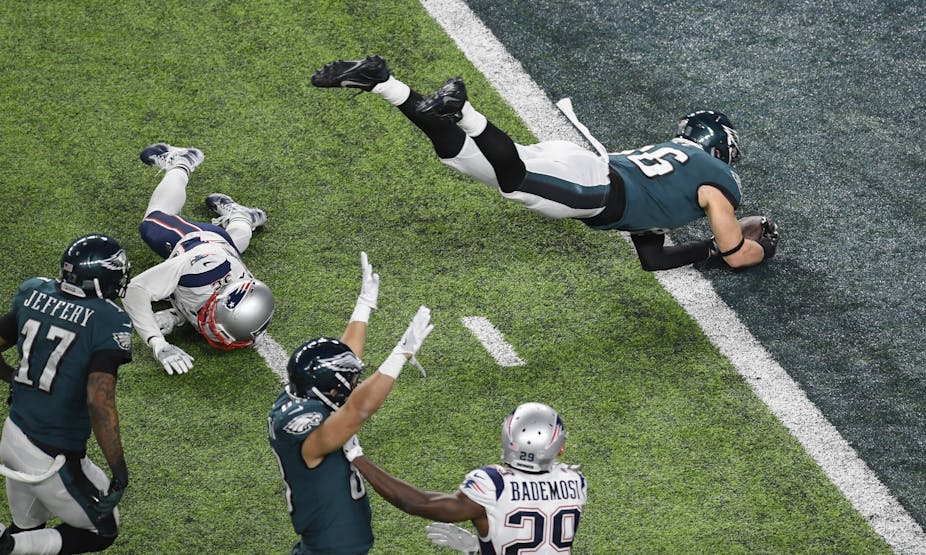The Philadelphia Eagles’ stunning defeat of the New England Patriots in this year’s Super Bowl will have fans talking about the game for years to come. As one of the biggest events in the annual sporting calendar – with around 100m people tuning in to watch it – the social media buzz around SB52 was huge. The event normally generates around 27m tweets – but it’s only sometimes about American football.
Mostly the chatter is about other things, including popstars and politics. In collaboration with Mentionmapp Analytics, a Twitter analysis tool, we examined what the social media conversations were about, plus who was leading and influencing them. Over the last week we have tracked and analysed relevant #Superbowl52 or #SB52 hashtags, Twitter accounts and message content. Bots, brand jackers, big shots, as well as traditional businesses all bossed the social media space.
Bots – web robots – are essentially software applications that run automated scripts, enabling simple tasks to be repetitively undertaken. The Super Bowl is fertile territory for them, as they can easily use event hashtags to draw peoples’ attention to brands and products. In particular, we saw a preponderance of betting bots churning out promotional offers and Super Bowl odds linked to gambling businesses.
Bots were also used to generate political propaganda posts. A number of automated messages promoting often extreme views were shared through the SB52 hastags with a wide audience. Although not exclusively an extremist phenomenon, America’s alt-right seems to have dominated in this regard, with many of its advocates trolling the event.
Several times during the week before the Super Bowl, the right-wing internet celebrity Laura Loomer loomed large in our analysis. In particular, her concerns about the Muslim community in Minnesota (where the event was staged) and the threat of terrorism garnered widespread attention among large numbers of Twitter users. As the game approached, the alt-right in general became even more vocal, gatecrashing the Super Bowl social media party by discussing it in an overtly political way.
Brand jacking involves someone or something appropriating the online identity of another social media entity, with the intention of using its brand assets for their own purposes. Big events like the Super Bowl have official partners, which pay a premium for the right to be associated with the show, including things like using official logos in their communications. Brands such as Michelob used Twitter to both create and sustain conversations around the event.
But a number of brands do not pay for this privilege. In traditional media, marketers might refer to this as ambushing. Plenty of businesses used the Super Bowl to promote their products – simply through using the hashtag or even going so far as to use official logos in their communications. We saw a number of bars and restaurants doing this to advertise their products during the game, even though they have no legal right of association. Others, which had nothing to do with the Super Bowl also jumped on the bandwagon, from web developers to video games companies.
Another person influencing the social media buzz, pretty much every day before the Bowl took place, was Kris Wu. Wu is a big shot Chinese-Canadian singer and former K-pop sensation. He recently signed a deal with the NFL to be an ambassador for the sport in China, which the NFL sees as a lucrative new market for American football.
As well as his half-time performance, Wu is also performing at a ten-day music festival in Minneapolis to mark the Super Bowl. It will be streamed by one of China’s biggest social media platforms, Tencent, and will showcase both the NFL and telecoms giant Verizon to the China market.
Television adverts shown during the Super Bowl have historically been the marketing showpiece of the event – to the extent that they have become part of its heritage and are eagerly awaited by viewers. But, as the world has shifted online and social media has enabled interactivity, so people are now talking about them on platforms like Twitter.
Whether it was armchair alt-right antagonists or China-focused cheerleaders championing corporate America, our analysis of social media conversations shows that the Super Bowl is a massive talking point. Who does the talking and what they talk about might not have anything to do with sport and can even be somewhat sinister. But one thing that hasn’t changed is that the conversation is often driven by vested interests.

